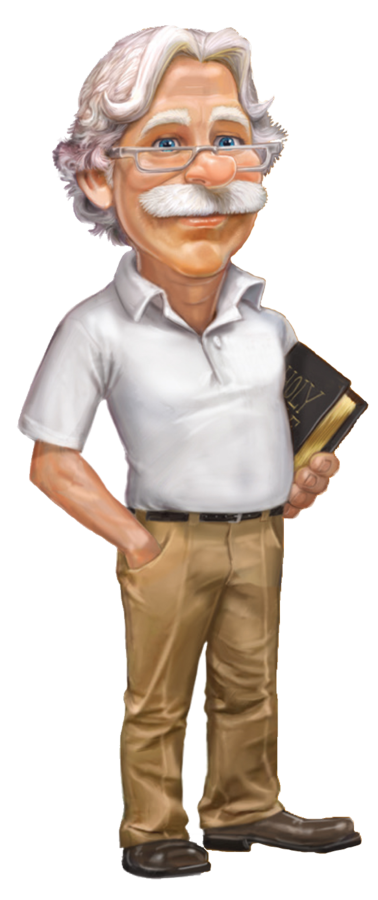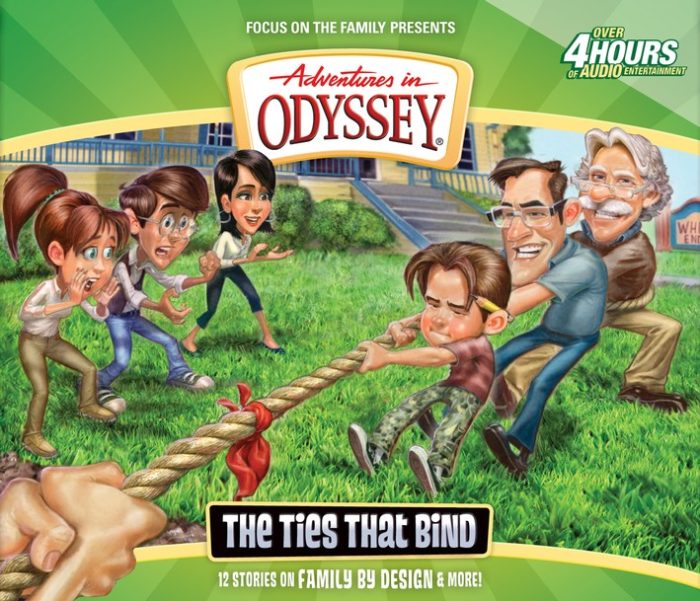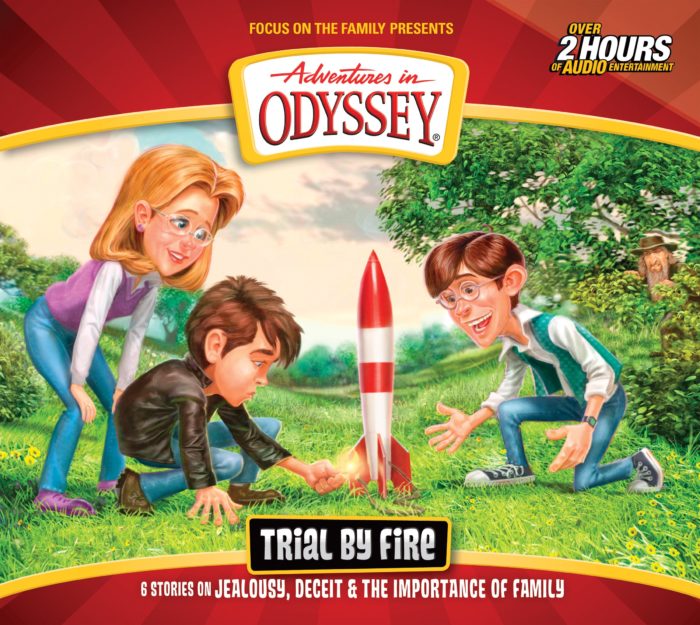Confessions of a Returning ‘Adventures in Odyssey’ Fan
You’re about to travel to a place of wonder, excitement, and rediscovery of the best Christian audio drama there is—Adventures in Odyssey.
And just this year, in fact, I finally rediscovered this “childhood” favorite.
I say “childhood” in quotes because, despite the long-running audio series’ official target audience of ages eight through twelve, I continued listening to the series well into my teen years. In fact, I could write a whole article simply exploring how Adventures in Odyssey, likely more than any other story series including The Chronicles of Narnia, first planted in me a desire to train my imagination for God’s glory.
Why did I ever stop listening to Adventures in Odyssey?
How could I have joined the ranks of those dreaded Christian teenagers, those traitors, who once told older-child me that sure, they had once listened to Odyssey sometimes, but somehow just trailed off?
I probably turned into this turncoat for similar reasons as they: I got busy with college, career, and of course, felt I’d grown too old for this series.
After all, Adventures in Odyssey first officially began thirty-two years ago this month.
On November 21, 1987, the ministry Focus on the Family, after taking its earliest forays into radio drama for grown-ups, launched that full series for kids.
From the very beginning, original creators Phil Lollar and Steve Harris set their story in the fictional small town of Odyssey in the United States. Here, folks of all ages—but mostly kids—could explore faith and imagination. Usually they did this in or around an ice-cream parlor and discovery emporium called Whit’s End, a wholesome and kids-can-only-dream shop owned by John Avery “Whit” Whittaker.
Another factor for my Odyssey interruption: technology simply changed. I’d moved beyond the cassette albums and even CD albums that still occupy that dresser drawer in my parents’ top-floor storage room. (Listening to it on Christian FM radio was even more out of the question.)
How then did I find my way back to Odyssey?
This is the part where I might sound like a shill. But I’m not. I’m just a passionate fan, for my very first fandom.
In short: I discovered the Adventures in Odyssey Club, and subscribed ($9.99 a month, and I use this way more than I use Netflix). I’ve been rediscovering that everything truly great about Odyssey is, more or less, just as it was when I was younger—but often even better.
Here are a few examples.
1. Mr. Whittaker lives on, even guided by his third voice actor.

John Avery Whittaker (as seen at the Adventures in Odyssey Wiki page)
Like the Doctor, Mr. Whittaker has “regenerated” when previous actors are no longer available to continue the part. (Whit is no Time Lord, unless you want to assemble some intricate fan theory; in which case, please invite me to join the fun.) In this case, Hal Smith began the role, Paul Herlinger continued it, and now Andre Stojka occupies that Victorian-style counter to serve the ice cream and biblical wisdom.
Each actor has brought out existing dimensions of our hero. Smith brought an “old Hollywood” voice actor style with heft and gravitas. Herlinger brought gentle, spiritual wisdom and often greater seriousness. Stojka brings joyous laughter and whimsy, even during serious situations.
Like Doctor Who fans, I’ve now twice insisted to myself that I won’t get used to this new regeneration of Whit. But I’ve soon warmed to the new chap. It helps that no matter the actor, the character is the same. Whit is the moral and imaginative anchor of Odyssey: great with kids, mysterious with his past, careful and biblical with his worldview yet equally eager to explore our God-given imaginations with kids and grown-ups alike.
Over thirty years, Whit has managed to be, all at once:
- a Bible teacher
- mechanical engineer
- archaeologist
- missionary
- fiction author
- publishing company founder and board member
- former United States military war hero
- and U.S. intelligence agent
- ceaseless community volunteer
- worldview apologist
- software programmer
- small business operator,
- and historian
as well as the ultimate pioneer in the field of virtual reality(?) biblical/historical/alternate universe full-immersive simulation, thanks to his development of the (surprisingly never-commercialized) Imagination Station technology.
In other words, Whit is the One-Punch Man of wise Christian elder statesmen. He seems to easily pwn C. S. Lewis, G. K. Chesterton, David Livingstone, the best Sunday school instructor at your parents’ church, your Greatest Generation uncle who served his country and stayed faithful to one woman and raised several children who (mostly) continue in the faith, and most of the twelve-plus Doctors Who, all rolled into one person.
But Whit is by no means perfect. His gently explored flaws, plus the wholesome yet realistic ethos of Odyssey as a whole, have lived in my imagination even during the ten-plus years I was no longer listening to Odyssey.
John Avery Whittaker is a complex man. But if there’s one thing that’s always been self-evident about him it’s his commitment to the upside-down ways of the kingdom of Heaven that defy the world’s ways—to the kingdom work of sacrificial service not political power.#JesusJuke pic.twitter.com/EMDiz00sn2
— Focus on the Family (@FocusFamily) May 8, 2019
And just like Whit, other heroes have matured in their own practice of biblical faith, such as Connie Kendall and Eugene Meltsner as well as newer heroes like Jason Whittaker and Wooton Bassett. Which leads to …
2. Odyssey presents the best of overt-level ‘Christian fiction.’

In this series, Odyssey’s residents consider God’s design for the family, including men and women, versus the “Let’s Get Together” festival that suggests other views. (This standout story arc deserves its own future review.)
In-universe and on our side of the “radio,” Whit doesn’t show partiality to his friends and the kids in Odyssey. He talks to kids with sensitivity, yet respects their rights and God-given abilities to consider in-depth matters. Such wondrous balance carries over into one of the show’s best features: occasional adventures that send our heroes, usually one or more children of Odyssey, directly into biblical narratives.1
For example, one two-part story dared to introduce its complex theme when two kids, siblings Olivia and Matthew Parker, enter Whit’s End disputing the merits of heroes. In short order, Mr. Whittaker has whipped up a biblical adventure in the Imagination Station. He sends the kids back in virtual(?)/imaginary(?) time to the era of King David, when the kingdom of Israel is in decay and God’s chosen ruler is suffering the consequences of his sin.
Yes, the story mentions Bathsheba specifically and yet sensitively, given its audience. But more so, the estranged Prince Absalom even cites the Tamar incident. He outright tells Olivia (paraphrased), “The details are not something children should hear.”
That’s perfect. At once this creative approach respects the show’s target audience of children ages eight through twelve, and shows sensitivity to parental concerns. But the story also does not sugarcoat the story. In fact, the two-part story’s entire theme is that even biblical heroes can act in terribly sketchy ways, and that God uses them anyway—but the only perfect hero we can worship is Jesus.
Back in contemporary life, Odyssey continues to pleasantly shock me with its occasional forays into stories that are basically for grown-ups. My imaginative world was quietly shattered one afternoon when the story introduced a three-part arc in which the older mother of a main character (a heroine known to Odyssey fans from the start) died suddenly. This begins an hour-plus, few-holds-barred exploration of grief and even the practical decisions of planning funerals, closing out a house, and dealing with the drama of an estranged father and suddenly revealed half-sibling. And all along, our heroine questions why God would let this happen, wonders about the biblical response to suffering, and gradually, painfully, begins to cope.
Adventures are never easy in Odyssey, and neither are the answers our heroes explore. But explore they do, not just the biblical themes and moral ideas, but through the wonders of people who live, work, quarrel, reconcile, and grow.
3. Odyssey is still superb and smart drama about people fans come to love.
Each Adventures in Odyssey story ends with the series’ perennial announcer, Chris (Anthony), drawing out the story’s moral.
At this point, some snarky Christians might roll their eyes. They’d say, Well, of course the story would do that, because that’s what Bad Christian Fiction always does, is wrap up everything with a nice tidy moral.
Of course, they’re wrong in concluding, simplistically, their own cheap moral that moral-of-the-story conclusions are always wrong. Especially when Odyssey stories frequently conclude not with a “tidy” or “clean” moral but with a challenge. Chris says:
- What did you think about this problem?
- Here’s something I noticed about Jason’s decision here.
- Christians have a lot of views about healing, and it’s complicated. One thing we do know …
And another thing we know is this: Adventures in Odyssey, despite its emphasis on moral themes, is first about its people. It’s centered on the fun, human, flawed yet growing residents of the town of Odyssey. No one is “perfect.” Not Whit. Not the Christian kids (who act very much like kids and get into lots of trouble). But nevertheless, this is a place I still wish were real—where even a grown-up, who first learned from Whit the very concept of enjoying our imaginations for God’s glory, can be a kid again and walk through that bell-equipped door at Whit’s End.
So, this Thanksgiving, I thank my God for all the creators of Adventures in Odyssey.
- When I was a child, I thought like a child, and I lived for those Imagination Station adventures with their fantastical time-travel elements and those amazing launch sequence sound effects. Now that I am a man, I still basically do this. ↩









































I don’t believe I’ve ever listened to an entire episode of Adventures in Odyssey. I’m not a huge fan of any form of radio drama and I wasn’t raised in a Christian home and exposed to Christian media as a child. My kids listened to it some, but none of them were huge fans.
Anyway, since I didn’t really know much about it, thanks for explaining what is good about the show and why it appeal(s)(ed) to you. Because I learned something new today. 🙂
Welcome back to Odyssey, friend. 😉 I’ve listened to AiO from when I was in my mother’s belly all the way up to present day. While I don’t listen to it every time it’s on the radio like when I was a kid, I never stopped listening entirely. I’d miss it too much. <3 The show has taught me so much about faith, family, and life over the years. It's made me laugh hard and cry hard. Comforted and uplifted me, and overall moved me in so many ways. The "Passages" book series which was in some ways a sort of spin off of the radio show was even one of the things that ultimately inspired me to become a writer. My life wouldn't be the same without Odyssey. I'm so glad it's still alive and well and pray it will continue to be there for generations to come.
When I was little, we had a couple Adventures In Odyssey movies my sister and I watched over and over again. Now and then we listened to the radio show, too, if it happened to be on while we were listening. I liked the shows, though I never became a super dedicated fan. If I had kids I’d probably try to get them into the show, though.
I grew up listening to Adventures in Odyssey, as well as other radio dramas (Texas Rangers, Gangbusters, Burns and Allen, etc.). Admittedly, I stopped listening regularly to AiO after a large portion of the original cast left, but I am slowly acquiring CDs from all my favorite albums, and I eagerly anticipate the day when I can introduce my children to these gems.
Yes! I love those old time radio shows too! Ever listened to I Was a Communist for the FBI?
I still own Albums 36 to 42. A lot of high quality material there. My favorite story was the Novacom arc. I think I remember Novacom so fondly because it was the first macro structure storyline I had ever experienced. Most episodes were episodic, but they were slowly building up the Novacom storyline in the background. It was mindblowing to see all of these seemingly unrelated plot threads tie together as Novacom exploded to the forefront. I was even more impressed when the writers addressed the aftermath of the Novacom story arc years later. (Still never found out what happened to the Chairman…). There were also several great episodes that still hold up today, such as the American Revolution two parter featuring Marvin.
The animated movies were okay.
Beautifully said. I almost purchased that monthly subscription when it first began too, and now you’ve convinced me that I should have. Guess it’s not really too late. Gonna have to look into that again now. You’ve reminded me of how much I loved listening to those stories with my kids, especially on long road trips. I’ve been away too long, obviously. 🙂
I started listening to adventures in odysseys when I got married to my wife. She introduced me to them. I have now enjoyed adventures in odyssey for over 20 years. I really enjoy and my children enjoy them also(though my children older than 16 quit listening to them but hopefully they will listen to them again someday.
What a fabulous article! I agree with all your points about what makes the show compelling after all these years. The multi-part club exclusive episode set in WWII Warsaw ghetto from a couple of years ago were some of the best episodes in the show’s history, in my opinion. I’ve been privileged to meet most of the show’s creative team as well as many of the actors and it’s made me appreciate all the more the hard work that goes into making a high-quality production.